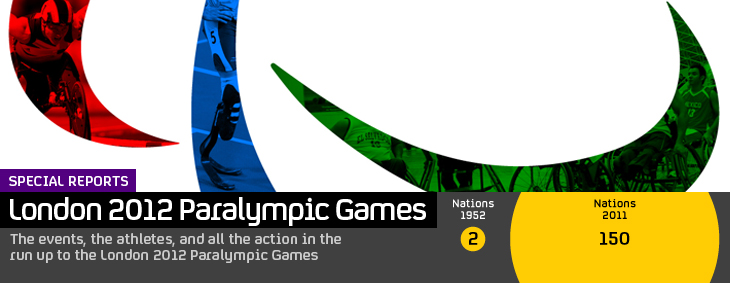Paralympic Games: a shared history of tragedy
“Our country is known by genocide, now we have a chance to go there and Rwanda be known by the good players, not by genocide, by sport.”

So says Jean Rukundo (pictured, left), a member of Rwanda’s sitting volleyball team. Rukundo fought in the Hutu army against Tutsi rebels in Rwanda’s bloody civil war, which claimed 800,000 lives. His team mate, and team captain, Dominique Bizmania, fought on the Tutsi side. In the same year two soldiers had their legs blown off.
They are, like many competing in the London 2012 Paralympic Games, visual reminders of the tragedies that have shaped the world in recent history – be that wars, illness or natural disaster.
Each national team has a different make-up of disabled athletes, creating an individual identity for the teams mapping their troubled pasts. Sri Lanka is another country whose bloody history of civil war is shown in its team.
Explore the map below to find Team GB's Paralympic athletes, including video interviews.
Sprinter Pradeep Sanjaya Uggl Dena Pathirannehelag, 26, was serving in the army in 2008 when his hand was severely injured in an artillery blast whilst Gamini Dissanayaka Mudiyanselage, 34, had his left leg amputated below the knee after stepping on a landmine in 2000. He will compete in the wheelchair tennis.
War has been a major factor in the make-up of the Paralympic teams this year, as demonstrated by Jimmy Carr’s visit to Headley Court, the Ministry of Defence’s rehabilitation centre, on the Jon Snow Paralympic Show last week.
Team GB’s Paralympians include five soldiers who sustained their injuries while on duty, including Fiji-born Derek Derenlagi, who competes in the discus, Ghurka Netra Rana, who plays sitting volleyball, and cyclist Jon-Allan Butterworth.

'I didn't really know I got hit until I got up'
"I was in Iraq in 2007 with the Royal Air Force and basically I got hit by shrapnel from a rocket attack. I didn't really know I got hit until I actually got up to my feet and went to find additional cover, and that was when I realised my arm was in a bad way.
I was injured at a round 6:50 am and they amputated by about three in the afternoon. I never had one of these moments when I thought what I am going to do now, my next job was to get better, to go through rehab and to get fit and to continue as normal.
The first thing I did was go to the pub. I was still on the critical list and was getting monitored every two hours and I escaped with my wife to the pub and had steak and chips and a pint of Guinness." - Jon Allen Butterworth (above)
Many countries competing will be fielding soldiers. The USA will field 21 active duty service members and veterans, an increase of five on their 2008 team. At least six out of Israel’s 25-strong team were injured in military conflicts.
Afghanistan’s only Paralympic athlete, powerlifter Mohammad Fahim Rahimi, is also a victim of conflict. He was injured stepping on a landmine in 1994, during the country’s civil war.
But war is not the only cause, or even the predominant cause, for disability with the Paralympic teams. Most of the disabilities have come from car accidents, hereditary conditions and illness.
Around a half of Team GB’s Paralympians are disabled through illness or a genetic condition, and 61, around 21 per cent of the team, are disabled through accidents. Most accidents were from cars or motorcycles, as well as sports injuries, work injuries and falls.
Illness is more of a factor in countries that have struggled in recent history to deal with outbreaks of viruses such as polio.
Poliomyelitis, the virsu which can cause paralysis, has been largely eradicated around the globe since 1988 due to global efforts. Since 1988 the number of cases has fallen by 99 per cent. Today only parts of three countries in the world remain endemic for the disease, Afghanistan, Nigeria and Pakistan.
However, many countries have battled with the virus and this can be seen in higher levels of polio victims present in teams from Mexico, India, Iran, Ghana and Vietnam.

In China’s team hot medal prospects Dong Qi, Liu Lei and Xiao Cuijuan (all power-lifting gold-medallists at Beijing) and Lisha Huang (a triple gold-medallist at Beijing, pictured left), are all polio sufferers.
And there are many other factors that have shaped the team. Team GB’s Martine Wright, the 7/7 survivor and double leg amputee, is a reminder of the advent of global terrorism.
Turkey’s Ismail Ar, who will compete in the wheelchair basketball, signifies the ever present threat of natural disasters. Ar was injured in the Turkish earthquake of 1999, a catastrophe that claimed 17,000 lives.
It will be difficult, when watching the Paralympians compete, to not be reminded of a tragic history that countries around the world share. For the athletes, however, it is now time to make some new history.
-
Latest news
-
Boy with profound learning disabilities reaches out of court settlement after abuse in residential school7m

-
India election: Modi rivals hit by string of raids and arrests7m

-
Can UK’s abandoned mines be used to build a greener future?5m

-
Sycamore Gap: Man pleads not guilty to felling iconic tree2m

-
‘Child poverty has not fallen since Tories came in’, says Gordon Brown5m

-





